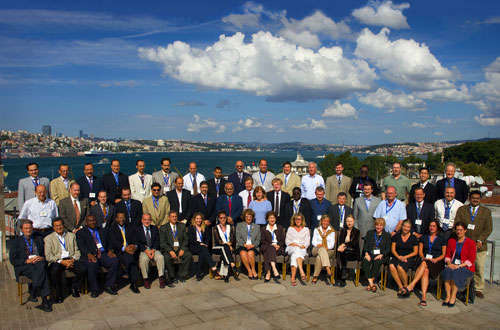A group of 58 professionals from 23 countries came together in the historic Sultanamet section of Istanbul, Turkey, to discuss the benefits and challenges of integrating substance abuse services into primary care, mental health, and social service systems. The conference, Delivery Systems for Substance Abuse Treatment: An International Conference, was co-sponsored by NIDA, the United States Institute of Peace, SAMHSA, the United Nations Office of Drugs and Crime Prevention, the World Health Organization, the International Society of Addiction Medicine and the U.S. Department of State. The meeting was organized and hosted by a group from the UCLA Integrated Substance Abuse Programs. In addition to providing an opportunity for individuals from developing countries to obtain current knowledge regarding service integration, the meeting also provided a forum to illustrate that individuals from diverse political systems, geographic regions, religions, ethnicities and disciplines could come together cooperatively and productively around the common problem of substance abuse.
The theme of the meeting emphasized the clinical and cost effectiveness benefits that developing countries could derive by building substance abuse treatment systems that are integrated within the health mental health and social service systems. This information was very timely for many of the attendee countries that are presently in the early stages of building substance abuse capacity. Representatives from the Middle East (7), Africa (5), and Eastern Europe (4) described the nature and extent of the substance abuse problems in their countries. Experts from eight countries presented reviews of research and health service literature, including NIDA-funded researchers Thomas Babor, Christine Grella, Walter Ling, Richard Rawson, and Constance Weisner. NIDA was represented by Jack Stein, Division of Epidemiology, Services and Prevention Research, and Ahmed Elkashef, Division of Pharmacotherapies and Medical Consequences of Drug Abuse.
Among the most notable presentations were those from the representatives of Iran, Ukraine, and Russia. Dr. Mokri Azarakhsch, Iran, described a very aggressive program of methadone treatment implementation to address opiate addiction and HIV transmission in the country. The work of the Iranian group, highlighting the role of injection drug use within the prisons in Iran, has spurred a major initiative within the Middle East to address prison drug use in other countries in the region. Reports from Ukrainian and Russian representatives underscored the devastating public health consequences of increased opiate addiction rates resulting from the expanding exports of opiates from Afghanistan and Central Asia.

Front Row: Ambros Uchtenhagen; Ahmed Elkashef; Solomon Rataemane; Donnie Watson; Richard Isralowitz; Mohammed Afifi; Valerie Pearce; Iris Mordecovich; Christine Grella; Constance Weisner; Gabriele Fischer; Selin Muderrisoglu Hatipoglu; Emily Meyers; Winnie Mitchell; Kerstin Stenius; Nina Ebner; Juana Tomás Rosselló
Middle Row: Sherif Atalah; Keith Humphreys; Jack Stein; Ramzi Haddad; Riaz Khan; Tarek El Shimi; Jamal Anani; Srinivasa Murthy; Peter Post; Suzie Post; Thomas Babor; Fred Kigozi; Michael Farrell; Walter Ling; Vladimir Poznyak; Moshe Kron; Levent Kuey; Tarek Gawad; Fayzal Sulliman
Back Row: Mehrdad Eftekhar Ardibili; Lubomir Okruhlica; Ahmed El Dosoky; Jallal Toufiq; Rabert Farnam; Mokri Azarakhsch; Nasser Loza; Mansour Mabrouk Shawky; Al Hasson; Andrej Kastelic; Stan Weisner; Robert Schilling; Todd Stankewicz; David Ndetei; Paul Restovich; Darren Urada; Richard Rawson